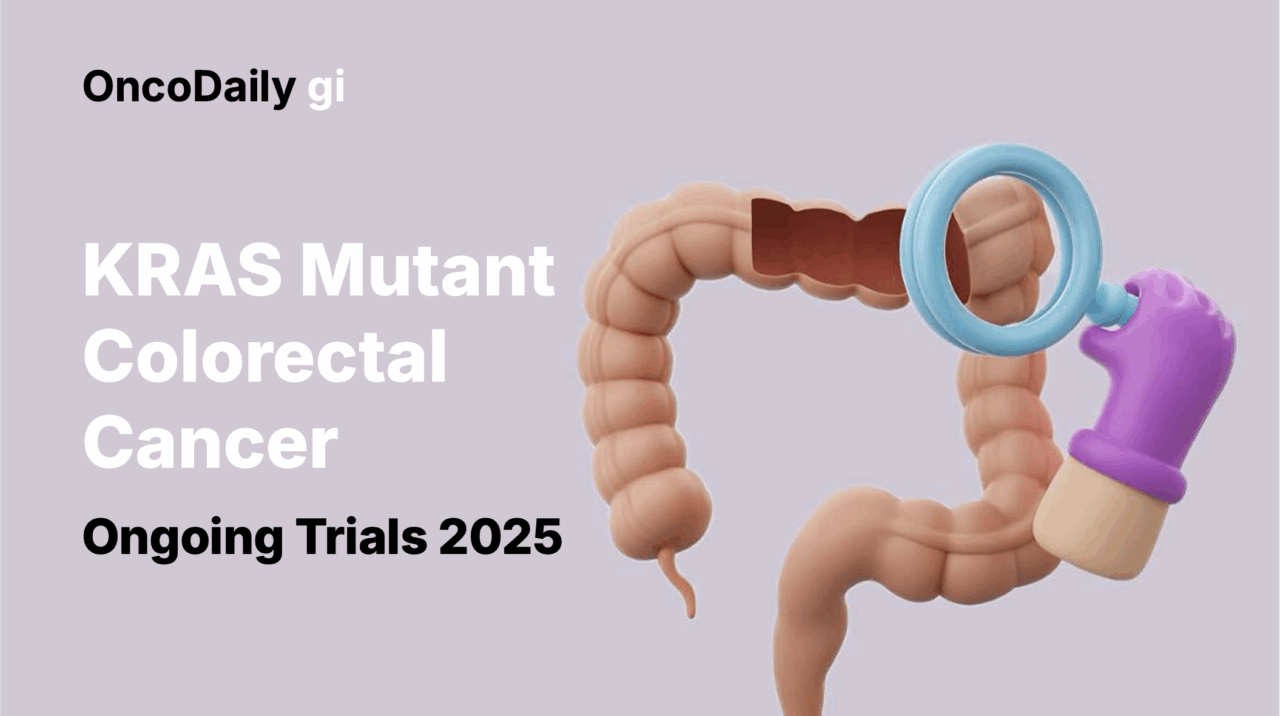Colorectal cancers harboring KRAS mutations, found in roughly 40–45% of metastatic cases, represent a major molecular subtype associated with resistance to EGFR-targeted therapy and limited benefit from standard chemotherapy. Until recently, KRAS was considered “undruggable,” but rapid advances in small-molecule inhibitors, protein degraders, and immunotherapy combinations have begun to shift this paradigm.
Over the past few years, the development of allele-specific KRAS G12C and G12D inhibitors, as well as emerging pan-RAS(ON) and cell-based therapies, has opened new treatment avenues and renewed optimism for this historically difficult-to-treat population. This article highlights the most significant active and recruiting clinical trials in KRAS-mutant metastatic colorectal cancer, outlining the strategies poised to redefine future standards of care.
JAB-21822 Combined With Chemotherapy in Second-Line KRAS G12C-Mutant Colorectal Cancer
Phase: II
Study Type: Open-label, interventional
Location: Peking University Cancer Hospital & Institute, China
Study ID: NCT06838338
This Phase II trial investigates the efficacy and safety of JAB-21822, a next-generation KRAS G12C inhibitor, in combination with standard second-line chemotherapy ± bevacizumab in patients with advanced or metastatic CRC harboring the KRAS G12C mutation. Although KRAS G12C inhibitors combined with anti-EGFR antibodies have shown clinical benefit and gained approval in Western populations, these therapies remain unavailable to Chinese patients.
Key Objectives
- Evaluate the anti-tumor activity of JAB-21822 plus chemotherapy in second-line treatment following standard therapy failure
- Assess safety, tolerability, and treatment-related adverse events in the Chinese population
- Explore efficacy markers through imaging (RECIST v1.1) and laboratory monitoring
Patients receive JAB-21822 with standard second-line chemotherapy (irinotecan- or oxaliplatin-based ± bevacizumab) until disease progression, unacceptable toxicity, or withdrawal. Imaging is performed every 6 weeks, with serial safety and biomarker assessments throughout treatment.
CodeBreaK 301: Sotorasib, Panitumumab, and FOLFIRI Versus Standard Chemotherapy in KRAS G12C-Mutant Metastatic Colorectal Cancer
Phase: III
Study Type: Multicenter, randomized, open-label, active-controlled
Location: Global, sponsored by Amgen
Study ID: NCT06252649
The CodeBreaK 301 trial is a pivotal Phase III study evaluating the combination of sotorasib (a KRAS G12C inhibitor), panitumumab (an anti-EGFR monoclonal antibody), and FOLFIRI chemotherapy versus standard FOLFIRI ± bevacizumab-awwb in treatment-naïve patients with KRAS p.G12C-mutated mCRC. The trial builds on earlier CodeBreaK studies that established KRAS G12C inhibition as a viable target and explores whether the triplet regimen can improve outcomes in the first-line setting.
Key Objectives
- Primary: Compare progression-free survival (PFS) between the investigational arm (sotorasib + panitumumab + FOLFIRI) and control arm (FOLFIRI ± bevacizumab)
- Secondary: Evaluate overall survival (OS), objective response rate (ORR), duration of response (DoR), and safety profile
- Exploratory: Assess biomarkers and resistance mechanisms associated with KRAS G12C inhibition
Approximately 450 participants will be enrolled across international centers. Participants receive treatment until disease progression, unacceptable toxicity, or withdrawal. If successful, CodeBreaK 301 could establish a new first-line standard of care for this genetically defined subset of CRC.
KANDLELIT-012: MK-1084 With Cetuximab and mFOLFOX6 in KRAS G12C-Mutant Metastatic Colorectal Cancer
Phase: III
Study Type: Randomized, open-label, multicenter
Location: Global, sponsored by Merck Sharp & Dohme LLC
Study ID: NCT06997497
The KANDLELIT-012 trial evaluates MK-1084, Merck’s investigational KRAS G12C inhibitor, in combination with cetuximab and mFOLFOX6 as first-line therapy for patients with locally advanced unresectable or metastatic CRC harboring KRAS G12C mutations. The regimen is compared against the current standard of care, mFOLFOX6 ± bevacizumab, to determine whether targeted inhibition plus chemotherapy can achieve superior outcomes.
Key Objectives
- Primary: Assess progression-free survival (PFS) of MK-1084 + cetuximab + mFOLFOX6 versus mFOLFOX6 ± bevacizumab
- Secondary: Evaluate overall survival (OS), objective response rate (ORR), duration of response (DoR), and overall safety and tolerability
- Exploratory: Identify biomarkers of resistance and molecular predictors of response to dual KRAS/EGFR blockade
Approximately 477 participants will be enrolled globally. The study includes two parts and aims to determine whether adding MK-1084 and cetuximab to oxaliplatin-based chemotherapy can delay disease progression or improve survival compared with the current first-line standard. If positive, KANDLELIT-012 may establish another frontline targeted therapy option for KRAS G12C-mutant mCRC.
PROSPER Trial: FMC-376 in KRAS G12C-Mutated Solid Tumors Including Colorectal Cancer
Phase: I/II
Study Type: Open-label, dose-escalation, dose-expansion, and cohort-expansion
Location: Global, sponsored by Frontier Medicines Corporation
Study ID: NCT06244771
The PROSPER trial explores FMC-376, an investigational KRAS G12C covalent inhibitor, in participants with locally advanced unresectable or metastatic solid tumors, including CRC, lung, and pancreatic cancers harboring the KRAS G12C mutation. This multi-part study aims to characterize safety, pharmacokinetics, and early signals of clinical efficacy across a broad spectrum of tumor types.
Key Objectives
- Phase 1A: Identify the recommended Phase 2 dose (RP2D) through dose-escalation and safety profiling
- Phase 1B/2: Evaluate antitumor activity in tumor-specific expansion cohorts, including metastatic colorectal cancer
- Exploratory: Investigate molecular correlates of response, resistance mechanisms, and combination potential with EGFR blockade or chemotherapy
Approximately 403 participants will be enrolled worldwide. Patients receive oral FMC-376 at escalating dose levels, followed by expansion in defined KRAS G12C-mutated tumor cohorts. For colorectal cancer, PROSPER may clarify the optimal dosing strategy and potential combinatorial approaches to overcome resistance seen with earlier-generation KRAS G12C inhibitors.
VS-7375: A First-in-Human Study of a KRAS G12D (ON/OFF) Inhibitor Alone and in Combination in Solid Tumors Including Colorectal Cancer
Phase: I/IIa
Study Type: Open-label, dose-escalation and dose-expansion
Location: Global, sponsored by Verastem, Inc.
Study ID: NCT07020221
The VS-7375 trial represents one of the first clinical studies targeting the KRAS G12D mutation, a common oncogenic driver in CRC, pancreatic, and non–small cell lung cancers (NSCLC). This Phase I/IIa study investigates VS-7375, a novel KRAS G12D (ON/OFF) inhibitor, both as monotherapy and in combination regimens, to define its safety, tolerability, and early efficacy across multiple solid tumors.
Key Objectives
- Phase 1: Determine the maximum tolerated dose (MTD), recommended Phase 2 dose (RP2D), and overall safety of VS-7375 as monotherapy
- Phase 2a: Assess antitumor activity in disease-specific expansion cohorts, including metastatic colorectal cancer, pancreatic ductal adenocarcinoma, and NSCLC
- Exploratory: Characterize biomarker responses, mechanisms of resistance, and potential synergy with immunotherapy and EGFR blockade
Planned combination regimens reflect tumor-specific biology: VS-7375 with cetuximab for colorectal cancer, gemcitabine ± nab-paclitaxel for pancreatic cancer, and carboplatin + pemetrexed + pembrolizumab for NSCLC. With an expected enrollment of 330 participants, the study aims to establish the first clinical benchmark for direct KRAS G12D inhibition across multiple malignancies.
Isunakinra Alone and in Combination With Pembrolizumab in MSS KRAS-Mutated Colorectal Cancer
Phase: IIa
Study Type: Non-randomized, open-label, dose-expansion
Location: Global, sponsored by Buzzard Pharmaceuticals
Study ID: NCT06634875
This Phase IIa study explores a novel immunotherapy strategy for microsatellite stable (MSS), KRAS-mutated locally advanced or metastatic CRC—a tumor type historically resistant to checkpoint inhibition. The trial evaluates isunakinra, a potent interleukin-1 (IL-1) inhibitor, administered alone or in combination with pembrolizumab (anti–PD-1) to overcome the immune resistance mechanisms characteristic of MSS, KRAS-mutant disease.
Key Objectives
- Primary: Evaluate safety and tolerability of isunakinra alone and in combination with pembrolizumab
- Secondary: Assess antitumor activity in terms of objective response rate (ORR), progression-free survival (PFS), and overall survival (OS)
- Exploratory: Investigate immune biomarkers, cytokine modulation, and tumor microenvironment changes in MSS KRAS-mutant colorectal cancer
Approximately 20 patients with previously treated, microsatellite-stable, high–tumor mutational burden (TMB-H), KRAS-mutated mCRC will be enrolled. By combining cytokine blockade with PD-1 inhibition, this study aims to determine whether dual immune modulation can unlock sensitivity to immunotherapy in this difficult-to-treat subgroup.
TSN1611: A First-in-Human Study of a KRAS G12D Inhibitor in Advanced Solid Tumors
Phase: I/II
Study Type: Open-label, multicenter, dose-escalation and dose-expansion
Location: China and global sites, sponsored by Tyligand Pharmaceuticals (Suzhou) Limited
Study ID: NCT06385925
The TSN1611 study is a first-in-human (FIH) trial investigating TSN1611, a novel KRAS G12D inhibitor, in patients with advanced or metastatic solid tumors harboring the KRAS G12D mutation. This mutation represents one of the most frequent oncogenic alterations in colorectal, pancreatic, and lung cancers, yet has remained therapeutically elusive until the emergence of direct G12D inhibitors.
Key Objectives
- Phase 1: Establish the maximum tolerated dose (MTD), dose-limiting toxicities (DLTs), and recommended Phase 2 dose (RP2D) of TSN1611
- Phase 2: Evaluate the efficacy and safety of TSN1611 monotherapy in tumor-specific cohorts, including colorectal cancer, pancreatic ductal adenocarcinoma, and non–small cell lung cancer
- Exploratory: Characterize pharmacokinetics (PK), molecular biomarkers of response, and mechanisms of acquired resistance
Approximately 150 participants will be enrolled. The Phase 1 dose-escalation part will determine the optimal dosing strategy, followed by Phase 2 expansion in distinct KRAS G12D-mutated tumor types. The study represents a significant milestone in expanding targeted therapy options for KRAS G12D-driven malignancies, including colorectal cancer.
ARV-806: First-in-Human Study of a KRAS G12D Protein Degrader in Advanced Solid Tumors
Phase: I/II
Study Type: Open-label, multicenter, dose-escalation and expansion
Location: Global, sponsored by Arvinas Inc.
Study ID: NCT07023731
The ARV-806 trial is the first-in-human evaluation of a novel targeted protein degrader designed to eliminate mutant KRAS G12D protein in advanced solid tumors, including colorectal, pancreatic, and other gastrointestinal cancers. Unlike small-molecule inhibitors that block KRAS activity, ARV-806 leverages the PROTAC® (proteolysis-targeting chimera) technology platform to induce selective degradation of the mutant oncoprotein, potentially providing deeper and more durable pathway suppression.
Key Objectives
- Phase 1: Establish the safety, tolerability, pharmacokinetics (PK), and recommended Phase 2 dose (RP2D) of intravenous ARV-806
- Phase 2: Evaluate preliminary antitumor activity at optimized dose levels in tumor-specific cohorts, including metastatic colorectal cancer and pancreatic ductal adenocarcinoma harboring KRAS G12D mutations
- Exploratory: Assess pharmacodynamic markers, KRAS pathway signaling suppression, and mechanisms of resistance to targeted protein degradation
Approximately 159 participants will be enrolled worldwide. In Part A (Phase 1), escalating IV doses of ARV-806 will determine the RP2D; in Part B (Phase 2), expansion cohorts will further explore efficacy in KRAS G12D-mutant cancers. By introducing direct oncoprotein degradation into clinical testing, ARV-806 represents a potentially transformative step in targeting KRAS G12D-driven malignancies, including colorectal cancer.
Adagrasib, Cetuximab, and Cemiplimab in KRAS G12C-Mutant Metastatic Colorectal Cancer
Phase: Ib/II
Study Type: Multicenter, open-label, interventional
Location: United States, sponsored by M.D. Anderson Cancer Center
Study ID: NCT06412198
This Phase Ib/II study investigates the triple-combination of adagrasib (KRAS G12C inhibitor), cetuximab (EGFR antibody), and cemiplimab (PD-1 inhibitor) in patients with metastatic CRC harboring KRAS G12C mutations who have progressed after at least one prior systemic therapy. Building on the success of adagrasib-based dual targeting, this trial adds immune checkpoint blockade to explore whether concurrent inhibition of KRAS, EGFR, and PD-1 pathways can generate deeper and more durable responses.
Key Objectives
- Primary: Determine the objective response rate (ORR) of adagrasib + cetuximab + cemiplimab in previously treated KRAS G12C-mutant mCRC
- Secondary: Evaluate duration of response (DoR), progression-free survival (PFS), overall survival (OS), and safety profile
- Exploratory: Identify predictive biomarkers of response and resistance, assess tumor microenvironment changes, and generate patient-derived xenograft (PDX) models for translational research
Approximately 31 participants will be enrolled. Treatment continues until disease progression, unacceptable toxicity, or withdrawal. The study aims to determine whether integrating immune modulation with targeted KRAS/EGFR inhibition can overcome residual resistance in KRAS G12C-mutant colorectal cancer.

Read more about Adagrasib (Krazati) Updates 2025: Uses in Cancer, Side Effects, Dosages, Expectations on OncoDaily.
LY3537982: A Next-Generation KRAS G12C Inhibitor in Advanced Solid Tumors
Phase: I/II
Study Type: Open-label, multicenter, dose-escalation and expansion
Location: Global, sponsored by Eli Lilly and Company
Study ID: NCT04956640
The LY3537982 study evaluates LY3537982, a next-generation KRAS G12C inhibitor, across a broad range of advanced solid tumors including colorectal, non–small cell lung, pancreatic, endometrial, ovarian, and biliary cancers harboring KRAS G12C mutations. Designed to improve potency, selectivity, and central activity compared with earlier agents, this Phase I/II trial explores both monotherapy and combination regimens.
Key Objectives
- Phase 1a: Assess safety, tolerability, and pharmacokinetics (PK) to identify the recommended Phase 2 dose (RP2D)
- Phase 1b/2: Evaluate antitumor activity in expansion cohorts, including colorectal cancer, and investigate rational combinations with targeted and immune therapies
- Exploratory: Characterize biomarker response, resistance mechanisms, and potential synergy with EGFR blockade and immunotherapy
Participants receive oral LY3537982 either alone or in combination with agents such as pembrolizumab (anti–PD-1), cetuximab (anti-EGFR), or platinum-based chemotherapy (cisplatin, carboplatin, pemetrexed). Approximately 540 participants will be enrolled globally across multiple tumor cohorts. For colorectal cancer, the trial may clarify LY3537982’s role as a monotherapy or combination partner in overcoming adaptive feedback resistance, potentially advancing the next wave of KRAS G12C-targeted precision oncology.
RAS(ON) Platform Study: RMC-6236 and RMC-9805 in RAS-Mutant Gastrointestinal Cancers
Phase: I/II
Study Type: Open-label, multicenter, platform
Location: Global
Study ID: NCT06445062
The RAS(ON) platform trial led by Revolution Medicines evaluates the next-generation inhibitors RMC-6236 and RMC-9805—agents that directly target the active (GTP-bound) form of RAS—in RAS-mutant colorectal and pancreatic cancers. The modular design allows testing of multiple combinations with chemotherapy and targeted agents.
Key Objectives
- Determine safety, recommended dose, and preliminary efficacy of RMC-6236 and RMC-9805
- Explore combinations with cetuximab, mFOLFOX6, and gemcitabine/nab-paclitaxel in RAS G12D and pan-RAS-mutant disease
Subprotocols include RMC-6236 or RMC-9805 with 5-FU–based regimens, cetuximab, or gemcitabine/nab-paclitaxel in unresectable or metastatic mCRC and PDAC. By inhibiting RAS in its “on” state, these agents aim to overcome adaptive resistance seen with earlier inhibitors.
WEF-001: First-in-Human Study of a Novel Agent in KRAS-Mutant Solid Tumors
Phase: I/IIa
Study Type: Open-label, multicenter
Location: Global, sponsored by Auricula Biosciences Inc.
Study ID: NCT07148128
This Phase 1/2a trial evaluates WEF-001, a first-in-class investigational compound for advanced KRAS-mutant solid tumors, including CRC, pancreatic, and non–small cell lung cancers. The study aims to define the drug’s safety, tolerability, pharmacokinetics, and early antitumor activity as monotherapy.
Key Objectives
- Determine dose-limiting toxicities and the recommended Phase 2 dose
- Assess preliminary efficacy in expansion cohorts of KRAS-mutant colorectal cancer and other tumor types
Approximately 110 participants will be enrolled worldwide. As a first-in-human program, WEF-001 may broaden the therapeutic landscape for patients with KRAS-driven malignancies beyond current G12C- or G12D-specific inhibitors. 
Read more about BRAF-Mutant Colorectal Cancer Active and Recruiting Trials You Need to Know in 2025 on OncoDaily.


